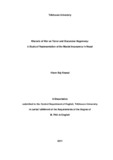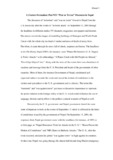Please use this identifier to cite or link to this item:
https://elibrary.tucl.edu.np/handle/123456789/275| Title: | Rhetoric of War on Terror and Discursive Hegemony: A Study of Representation of the Maoist Insurgency in Nepal |
| Authors: | Khanal, Khem Raj |
| Keywords: | news headlines;Nepali politicians |
| Issue Date: | 2011 |
| Publisher: | Department of English Education |
| Abstract: | This research work exploresthe interpellation between the U. S. discoursesof “war on terror”and counter insurgencyinNepal.It interrogateshow the discourse of “terrorism”and“war on terror”flows to Nepal throughmediascapes. For this, I analyze the news headlines ofThe Rising Nepal, in relation to the U. S. War onterror. Iscrutinizenewsheadlines,publishedbetween 9/11 and November 26 (onthedate Maoists were declaredterroristby the government of Nepal), whichsharethe semioticsof the powerful rhetoric ofwar on terror and also the responsesback.The research reveals thehegemonizing effect oftherhetoricof war on terror especially in the Nepali politicianswhoadoptedit toconceptualize and representthe Maoists insurgency. After exploring the connectionbetween war on terror andthe Maoists insurgency, it movesontoexposehow the U. S. and Indian attitudehave influenced Nepali political discourses especially regardingthe label ‘terrorist.’ Toexplore American attitude, a speech of an American envoy to Nepal has thoroughly been analyzed,particularlyin referenceto theMaoists conflict.The discourse also helped India continue its influence in Nepal’s defense system and political directions of the conflict in Nepal. Thus the discourse helped weakening the sovereign decision making power of Nepali politicians and made the nation susceptible to international interference. During the insurgency, the Maoists resisted the label of terrorist on them through the rhetoric of Marxist-Leninist-Maoistdialectics re-contextualized as ‘prachandapath’ to fit in Nepal. The researchexplores thatthehegemony of the rhetoricof war on terror discourse in non-Maoist partiescollideswiththeMaoist’s rhetoric of ‘capturing of the power.’In such collision, a‘state of exception’is created, in which the country is disposed further to the foreign interference, and each individual in the state turnsinto the ‘homo sacer/bare life,’losing every right to life. |
| URI: | http://elibrary.tucl.edu.np:8080/jspui/handle/123456789/275 |
| Appears in Collections: | English |
Files in This Item:
| File | Description | Size | Format | |
|---|---|---|---|---|
| cover.pdf | 16.19 kB | Adobe PDF |  View/Open | |
| chapter.pdf | 439.86 kB | Adobe PDF |  View/Open |
Items in DSpace are protected by copyright, with all rights reserved, unless otherwise indicated.
